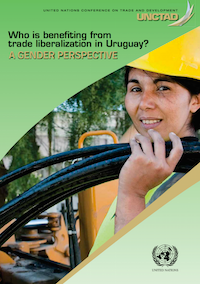
Who is benefiting from trade liberalization in Uruguay? A gender perspective

United Nations Conference on Trade and Development (UNACTD) aims to contribute to the analysis of the linkages between trade policy and gender equality, and to the related international debate, by looking at specific country experiences. This study is one in a series of case studies that are being conducted by UNCTAD in seven developing and least developed countries, namely Angola, Bhutan, Cabo Verde, Lesotho, The Gambia, Rwanda and Uruguay. This report aims to assess the implications of Uruguay’s productive transformation, trade liberalization, and regional trade integration on women, especially in terms of their access to employment.
While women play many roles in society, this report focuses on their role as workers. This report encourages the reader to take into account the complexities of the trade and gender link and its numerous, and sometimes hidden, connections with the micro and macro components of economic and development processes. The research also highlights that Uruguay’s legal framework as well as social norms and stereotypes contribute to the role that women play in the labour market and society. The long-term approach of the study, covering three decades of economic and social reforms, provides the basis for anticipating the role that the female workforce may play in Uruguay in the decades ahead. Finally, the study also demonstrates that social changes usually occur at a relatively slow pace.